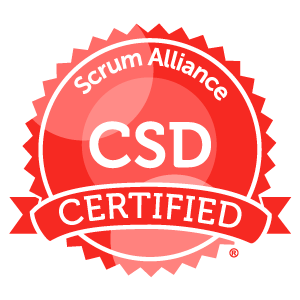Certified Scrum Developer (CSD)

Overview
The Certified Scrum Developer (CSD) certification from Scrum Alliance is designed specifically for software developers who want to deepen their understanding of Agile development practices within the Scrum framework. This certification validates both technical skills and a developer’s knowledge of Scrum, preparing them to deliver high-quality code within Agile teams.

Key Facts :
- Date Launched: 2011
- Founder: Scrum Alliance
- Number of Certified Professionals: Tens of thousands globally
- Global Recognition: The CSD certification is widely respected by employers and is recognized as a foundational credential for developers in Agile environments.
Target audience :
The CSD certification is aimed at software developers, technical leads, architects, and anyone working closely with development teams in a Scrum environment. It’s especially beneficial for professionals who want to work in Agile roles or contribute to Scrum teams across industries such as IT, finance, healthcare, and e-commerce.
Certification Objectives
The Certified Scrum Developer (CSD) certification validates the following key skills and knowledge:
- Scrum Fundamentals: Knowledge of Scrum roles, events, and artifacts as they relate to software development.
- Technical Practices: Proficiency in Agile technical practices like test-driven development (TDD), continuous integration (CI), and automated testing.
- Effective Collaboration: Ability to work collaboratively within cross-functional Scrum teams, promoting transparency and open communication.
- Incremental Delivery: Skills for delivering functional product increments iteratively and continuously improving based on feedback.

Skills and Knowledge Gained

The CSD certification equips candidates with essential skills and knowledge to work effectively within Agile teams. Key skills and knowledge areas include:
- Agile Development Practices: Mastery of essential technical practices, including TDD, CI, and refactoring, to maintain code quality.
- Collaborative Problem-Solving: Skills for enhancing teamwork within cross-functional Scrum teams.
- Facilitation of Scrum Events: Understanding the role and purpose of each Scrum event in development, including Sprint Planning and Retrospectives.
- Adaptation and Continuous Improvement: Techniques for adapting to change and consistently improving development processes in an Agile environment.
Detailed Breakdown of the Certification Process
Steps to Certification
Pre-requisites: While there are no formal prerequisites, it is recommended that candidates have a fundamental understanding of Scrum and Agile development practices. Completing the Scrum Guide (available for free) and reviewing Agile technical practices are beneficial.
Training Requirements: Formal training is required to obtain the CSD certification. Scrum Alliance offers various training options, including multi-day workshops and online modules led by Certified Scrum Trainers (CSTs). These courses provide hands-on experience with Agile technical practices and better prepare candidates for the CSD certification.
Exam Format
- Number of Questions: 50
- Question Type: Multiple-choice and true/false
- Time Limit: 60 minutes
- Passing Score: 74%
- Retake Policy: Candidates who do not pass may retake the exam after purchasing another attempt.
Certification Levels :
Scrum Alliance offers various levels of certification for developers and other Agile roles, each validating different competencies in Scrum and Agile practices.
Recertification :
The CSD certification requires renewal every two years, making continuous learning and practice essential for maintaining certification.

Key Benefits of the Certification for Organizations

Impact on Teams and Organizations :
Organizations with CSD-certified professionals benefit from improved code quality, more efficient development cycles, and enhanced team collaboration. Developers trained under this certification bring technical expertise that helps Agile teams deliver high-quality software in shorter, iterative cycles.
Real-World Application :
At companies like IBM and HP, CSD-certified developers have played a key role in reducing software release times by 25%, improving cross-functional collaboration, and increasing overall team efficiency. The Scrum framework, combined with Agile technical practices, has proven especially effective in enabling teams to adapt quickly to market changes.
Industry Recognition :
The CSD certification is recognized by leading companies such as Oracle, Dell, Capgemini, and SAP, all of which prioritize hiring developers with this credential. This global recognition makes CSD one of the most respected and sought-after certifications for Agile developers.
Case Studies :
At Cisco, Agile development led by CSD-certified developers resulted in 20% faster release cycles and a notable improvement in software quality. Another example is Siemens, where CSD-certified professionals supported Agile transformations that led to a 30% reduction in software defects and more reliable releases.
Certification Costs and Value Proposition
Cost of Certification :
The CSD exam costs vary by training provider, generally ranging between $500 and $1,500. Formal training is mandatory for certification. Scrum Alliance’s Certified Scrum Developer courses typically costing between $800 and $1,500, depending on the provider and location.
Return on Investment (ROI) :
The ROI for the CSD certification is considerable. Certified professionals report an average salary increase of 10-15% within their first year of certification. Additionally, CSD-certified developers are often considered for advanced roles in Agile teams, helping to accelerate their career growth.
Financial Aid and Discounts :
While Scrum Alliance does not offer direct financial aid, many training providers provide group discounts for companies certifying multiple employees. Organizations that sponsor training for larger teams often receive reduced rates, making certification more accessible for groups.

Comparison with Other Certifications

Competitor Analysis :
The CSD certification is often compared to other development-focused certifications like the Professional Scrum Developer (PSD) from Scrum.org and the Agile Certified Practitioner (PMI-ACP) from PMI. While both CSD and PSD emphasize Agile technical skills, the CSD requires formal training and is known for its hands-on approach through Certified Scrum Trainers (CSTs), ensuring thorough practice in Agile development skills.
Unique Features :
CSD stands out for its focus on development-specific Agile practices and the practical, workshop-based training led by Certified Scrum Trainers (CSTs). Additionally, unlike the PSD, the CSD certification requires renewal every two years, promoting continuous learning and skill refinement in Agile practices.
Industry Trends :
As organizations increasingly adopt Agile frameworks and prioritize code quality, certifications like CSD are becoming more essential. The CSD emphasizes Agile technical practices and collaboration within cross-functional teams. It making it ideal for developers working in evolving digital and remote-first environments.
Success Stories and Testimonials
Case Studies :
At Philips, CSD-certified developers were instrumental in improving development efficiency, resulting in a 15% reduction in time-to-market for new products. Similarly, at Toyota, Agile transformations led by CSD-certified professionals helped increase code quality and reduce defect rates by 30%, streamlining the entire development process.
Personal Success :
Michael Lee, a CSD-certified developer at IBM, shared how the certification enabled him to advance from a junior developer role to becoming a team lead on Agile projects. “The CSD certification gave me practical skills in Agile development, which made a real impact on my career growth and confidence in leading technical teams.”
Notable Companies :
Top companies like Oracle, Cisco, HP, and Bosch all require or prefer CSD certification for their Agile developers. It reinforcing its value and recognition in the tech industry.

The Future of Agile and This Certification

Emerging Trends :
As Agile practices continue to advance, certifications like CSD are adapting to address challenges such as Agile scaling, remote development collaboration, and the integration of DevOps and AI-driven development tools. The CSD certification remains highly relevant, equipping developers with technical skills that are increasingly vital in modern Agile teams.
Future Updates to the Certification :
The Scrum Alliance regularly reviews and updates the CSD certification to keep pace with industry trends. Future updates may include greater emphasis on remote collaboration tools, advanced technical practices such as continuous deployment, and practices for maintaining code quality in distributed Agile environments.
Relevance in a Changing Market :
With businesses facing increasingly complex development demands and fast-evolving market conditions, the need for certified Agile developers is set to grow. The CSD certification helps developers stay competitive. It providing them with the skills needed to work effectively in high-performing Agile teams, especially in industries undergoing rapid digital transformation.
Conclusion
The Certified Scrum Developer (CSD) certification is an invaluable asset for developers committed to excelling in Agile environments. By validating both technical expertise and a deep understanding of Scrum principles, the CSD certification equips professionals to contribute meaningfully to high-performing Agile teams. For developers looking to enhance their skills and impact in Agile projects, the CSD certification offers a significant advantage and sets a strong foundation for career growth in an ever-evolving industry.